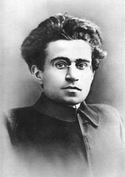Antonio Gramsci Quote
Related Quotes
Have you ever plunged into the immensity of space and time by reading the geological treatises of Cuvier? Borne away on the wings of his genius, have you hovered over the illimitable abyss of the past...
Honore de Balzac
Tags:
civilization, cuvier, discoverer, discovery, feeble, fossils, genius, geology, george byron, george gordon byron
Quite recently the human descent theory has been stigmatized as the 'gorilla theory of human ancestry.' All this despite the fact that Darwin himself, in the days when not a single bit of evidence reg...
Henry Fairfield Osborn
Tags:
ancestor, biology, charles darwin, darwin, evidence, evolution, fossils, human descent, human evolution, monkey
An evolutionary perspective of our place in the history of the earth reminds us that Homo sapiens sapiens has occupied the planet for the tiniest fraction of that planet's four and a half thousand mil...
Richard E. Leakey
Tags:
accident, biology, earth, evolution, fossil record, fossils, history, homo sapiens, mortality, science
About Antonio Gramsci
Antonio Francesco Gramsci (UK: GRAM-shee, US: GRAHM-shee; Italian: [anˈtɔːnjo franˈtʃesko ˈɡramʃi] ; 22 January 1891 – 27 April 1937) was an Italian Marxist philosopher, linguist, journalist, writer, and politician. He wrote on philosophy, political theory, sociology, history, and linguistics. He was a founding member and one-time leader of the Italian Communist Party. A vocal critic of Benito Mussolini and fascism, he was imprisoned in 1926, where he remained until shortly before his death in 1937.
During his imprisonment, Gramsci wrote more than 30 notebooks and 3,000 pages of history and analysis. His Prison Notebooks are considered a highly original contribution to 20th-century political theory. Gramsci drew insights from varying sources — not only other Marxists but also thinkers such as Niccolò Machiavelli, Vilfredo Pareto, Georges Sorel, and Benedetto Croce. The notebooks cover a wide range of topics, including the history of Italy and Italian nationalism, the French Revolution, fascism, Taylorism and Fordism, civil society, the state, historical materialism, folklore, religion, and high and popular culture.
Gramsci is best known for his theory of cultural hegemony, which describes how the state and ruling capitalist class — the bourgeoisie — use cultural institutions to maintain wealth and power in capitalist societies. In Gramsci's view, the bourgeoisie develops a hegemonic culture using ideology rather than violence, economic force, or coercion. He also attempted to break from the economic determinism of orthodox Marxist thought, and so is sometimes described as a neo-Marxist. He held a humanistic understanding of Marxism, seeing it as a philosophy of praxis and an absolute historicism that transcends traditional materialism and traditional idealism.
During his imprisonment, Gramsci wrote more than 30 notebooks and 3,000 pages of history and analysis. His Prison Notebooks are considered a highly original contribution to 20th-century political theory. Gramsci drew insights from varying sources — not only other Marxists but also thinkers such as Niccolò Machiavelli, Vilfredo Pareto, Georges Sorel, and Benedetto Croce. The notebooks cover a wide range of topics, including the history of Italy and Italian nationalism, the French Revolution, fascism, Taylorism and Fordism, civil society, the state, historical materialism, folklore, religion, and high and popular culture.
Gramsci is best known for his theory of cultural hegemony, which describes how the state and ruling capitalist class — the bourgeoisie — use cultural institutions to maintain wealth and power in capitalist societies. In Gramsci's view, the bourgeoisie develops a hegemonic culture using ideology rather than violence, economic force, or coercion. He also attempted to break from the economic determinism of orthodox Marxist thought, and so is sometimes described as a neo-Marxist. He held a humanistic understanding of Marxism, seeing it as a philosophy of praxis and an absolute historicism that transcends traditional materialism and traditional idealism.
